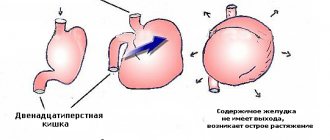Causes
In a puppy and an adult Spitz, diarrhea can be caused by the following reasons:
- infections;
- parasites;
- poisoning;
- binge eating;
- inflammation of the gastrointestinal tract;
- change of feed;
- improper feeding;
- transition from one type of food to another.
Acute diarrhea in a Pomeranian can be caused by infections such as parvovirus enteritis or coronavirus gastroenteritis.
Salmonella can cause diarrhea in Spitz puppies under 8 months of age. One of the reasons for the development of infection is the inclusion of raw eggs in the dog’s diet.
In young Spitz dogs, diarrhea is often caused by a parasitic disease such as giardiasis. In the acute course of the disease, bloating and tenderness of the abdomen is observed. Diarrhea alternates with constipation. This symptomatology is also characteristic of helminthic infestations.
If your pet picks up any object or piece of food from the ground while walking, there is a risk of developing poisoning. Expired or improperly stored food can also cause intoxication in an animal.
Regular overfeeding of a Spitz can not only lead to stool upset, but also threatens subsequent obesity.
The cause of diarrhea can be pathologies of the gastrointestinal tract of an inflammatory nature. These include gastritis, ulcers, enteritis.
Malabsorption syndrome caused by intestinal pathologies is accompanied by diarrhea in dogs. The pathological condition is dangerous for the pet due to inability to absorb nutrients obtained from food.
Often a Spitz is vilified because the owner feeds the pet incorrectly, including prohibited foods in its diet. These include grapes, mushrooms, everything fatty, spicy, salty. High-fat cow's milk can also cause diarrhea in some representatives of the breed.
Reasons for concern
Yellow vomiting against a background of weakness, lack of appetite, and fever is a sign of diseases of the gastrointestinal tract or other internal organs.
Symptoms may include diarrhea and an unpleasant odor from the Toy Terrier's mouth.
The most common diseases:
- Chronic gastritis is inflammation of the inner lining of the stomach. With it, the dog vomits with an admixture of mucus and bile, on an empty stomach. It differs from hungry vomiting in that the dog loses its appetite, its coat loses its shine and well-groomed appearance, and it looks weak.
- A stomach or intestinal ulcer or tumor of the gastrointestinal tract is indicated by frequent vomiting of yellow foam with undigested food, regardless of when the dog was fed. If food lingers in the stomach for several hours, rejection occurs with an unpleasant odor.
- With inflammation in the gallbladder - cholecystitis - belching and vomiting with yellow foam often occurs after eating. The dog's belly swells, growls, and he develops diarrhea or, conversely, constipation.
- Pay attention to the dog's posture. The toy terrier sits with his front paws wide apart - his stomach hurts. If yellow vomiting occurs regularly, along with yellow-green diarrhea and fever, this means that the dog has hepatitis. The virus affects the liver or other organs.
- Helminthiasis. Infection is accompanied by vomiting, sometimes with helminths, and diarrhea. Toy terriers experience bloating, the coat loses its shine, and the dogs lose weight. If a puppy is infected with helminths, it will not grow.
What to do when you notice any of the following signs:
- remember what and when the animal was fed, and not give more food;
- provide the dog with peace;
- Give plenty of water, because the body becomes dehydrated;
- do not give any drugs other than adsorbent ones, for example, activated carbon, enterosgel.
When giving your dog the pill, be gentle but firm.
Press your thumb and index finger on the toy's cheeks so that it opens its mouth. Place the tablet on the root of the tongue, close the mouth, raise the head up and stroke the throat so that the dog swallows.
Clinical picture
Scientifically, diarrhea is called diarrhea. But this does not make the clinical picture of the disease any more attractive. The puppy's bowel movements become frequent and have a runny or mushy consistency. Experts distinguish between acute and chronic diarrhea in a puppy.
- Acute – the most common. It occurs abruptly in the presence of a disease or disruption of the gastrointestinal tract due to improper nutrition or a change in its regime during the transition from maternal feeding to normal feeding.
- Chronic is characterized by periodic recurrence and indicates serious disorders in the body.
There are several breeds that are most often susceptible to chronic diarrhea:
- German Shepherds; despite its versatility, this breed is one of the most vulnerable to constant diarrhea;
- Great Danes;
- Yorkies;
- South Russian Shepherd Dogs;
- Pinschers.
When choosing the breed of your pet, be prepared to fight this disease.
Stomach upset and diarrhea in puppies are usually accompanied by other symptoms:
- increased thirst or, conversely, refusal to drink;
- refusal of food;
- fever;
- purulent nasal discharge;
- chills, low temperature.
Let's consider the most dangerous variants of the diseases that these symptoms usually indicate.
The puppy vomits immediately after eating undigested food. Main reasons
Why an animal might vomit in the first place depends on a variety of reasons. However, here you can also find positive aspects of such a seemingly pathological process. First of all, vomiting in its essence is a certain defense of the body, during which toxins that cause poisoning are released from it, and cleansing in general occurs. Thus, the animal’s stomach, as it were, self-cleanses itself of harmful substances.
Thus, it is necessary to highlight the main reasons that can cause vomiting of undigested food in an animal:
- poisoning can occur due to the fact that there is some kind of infection in the dog’s body;
- Vomiting can be caused by the dog eating something of poor quality. Most often, the animal’s appetite is so great that it can take food out of the trash can or pick up scraps on the street while walking;
- Vomiting is caused due to the fact that a foreign object is stuck in the dog’s throat. This phenomenon can be cured simply by removing the foreign object;
- poisoning with poisons or other harmful substances;
- the presence of helminthic infestations in the pet. It is urgent to carry out high-quality deworming;
- intestinal obstruction;
- your pet may need help due to quite serious overeating;
- various allergic reactions to food and other food products or negative factors;
- heatstroke in a dog, which can cause fever after spending a long time in the sun;
- various stressful situations;
- trauma or concussion.
Symptoms and pattern of bowel movements
Diarrhea is spontaneous. A few minutes ago, a pet that is feeling well may begin to diarrhea. It is important to pay attention to the color of the stool, the presence or absence of impurities in it. Liquid feces can be:
- yellow;
- black;
- green;
- with blood;
- with mucus
The color of the stool can suggest a problem that caused diarrhea in the Spitz.
Black diarrhea sometimes indicates internal bleeding. In this case, immediate consultation with a doctor is required.
If the stool is yellow, it can be assumed that there is a malfunction of the liver or helminthiasis.
If a Spitz has yellow diarrhea with a strong unpleasant odor, then the development of parvovirus enteritis or coronavirus gastroenteritis should be suspected. In the presence of these pathologies, vomiting is also observed in the animal.
White stools indicate a lack of bile in the feces, which is often a symptom of bile duct blockage.
Bloody diarrhea in some cases is a sign of a viral infection or intestinal injury (after bones).
The presence of blood and mucus in the stool, vomiting, and temperature indicate salmonellosis in a Spitz puppy.
Green diarrhea can signal putrefactive processes or fermentation in the intestines, dysbacteriosis, viral and bacterial infections, and pathologies of the gastrointestinal tract.
Causes of Yorkshire Terrier Vomiting
The Yorkshire Terrier, as a decorative dog breed, at birth often has pathology of the liver, pancreas and stomach. This does not mean that the animal is in poor health. Miniature internal organs, which do not always cope with diseases, are responsible for the deviations that arise. There are several causes of vomiting.
Initially, vomiting is preceded by nausea, copious amounts of saliva, and after a stomach spasm, food debris is ejected from the intestines.
In puppies up to one year old, the main causes of vomiting are:
- helminth infection;
- low glucose levels;
- viral disease.
Adult Yorkshire Terriers suffer from vomiting due to:
- intoxication of the body;
- unbalanced nutrition system;
- age-related changes in internal organs.
After vomiting, you should completely prohibit eating and drinking frequently. If the dog refuses to drink on its own, it is necessary to forcefully inject liquid. The anti-inflammatory properties of a warm decoction of chamomile will calm the stomach. A sick animal requires observation and, if the urge becomes more frequent, seek help from specialists for a complete examination.
The Yorkshire Terrier, like most breeds, has several types of vomiting.
It should not cause any particular concern to the owner. The processes that occur in the dog’s stomach after eating produce a whipped mixture of bile and mucus. The release of white foam is considered normal.
After a dog eats fresh grass, vomiting with bile and grass serves as a kind of digestive cleansing for the dog. The active state of the pet indicates a lack of anxiety. In other cases, vomit with a yellow tint indicates the presence of a serious stomach disease. The following can contribute to the development of gastritis:
- improperly selected nutrition;
- an abundance of fatty foods;
- poor quality food;
- Particular attention should be paid to the possible presence of worm eggs in the animal.
Lethargy, unsteady gait and lack of appetite are factors for visiting a doctor.
The occurrence of blood vomiting in a dog indicates a critical condition of the esophagus. Gastric blood flow can form for the following reasons:
- erosion or stomach ulcer;
- infectious infection: plague, hepatitis;
- oncology;
- diabetes;
- damage to the walls of the stomach with objects with sharp edges.
The presence of brown or black clots in the vomit means an immediate visit to the veterinarian. Delay threatens death.
General article on vomiting in dogs.
Causes, methods of treatment.
Only careful care and proper nutrition can prolong the life of the Yorkshire Terrier. Careful observation of the dog’s behavior and condition is the key to a healthy and active life.
(9 votes, average 3.11 out of 5)
If your little pet begins to periodically suffer from vomiting, then it’s time to find out the cause of the ailment and eliminate it.
Vomiting in a Yorkshire Terrier is a consequence of the slow functioning of the gastrointestinal tract. That is, the dog’s ventricle stops pushing the food that enters it down towards the intestines. There is a reverse movement of food up the esophagus. This is how the dog starts vomiting.
Small Yorkie puppies may vomit for the following reasons:
- The presence of parasites in the body;
- Any infectious disease (food poisoning).
In adult Yorkshire Terrier dogs, vomiting occurs in the following cases:
- Food poisoning;
- Improperly organized diet (eating a large amount of fatty foods at one time or simply feeding too densely);
- Liver or kidney disease (especially observed in dogs over 8 years of age);
- Chronic or acute pancreatitis.
In any case, a veterinarian should find out the reason for the onset of vomiting in your pet. So you shouldn’t postpone a visit to the doctor if York is vomiting regularly.
There are also cases when periodic vomiting in a little Yorkie is considered normal. These are:
- Vomiting small amounts of consumed food for your small puppies from a lactating bitch;
- Vomiting at intervals of 1-2 times a week (this may simply be coughing up hair that has entered the esophagus, which entails an unpleasant condition for the dog).
In other cases, if, against the background of periodic vomiting, the general condition of the Yorkie changes, the pet’s mood becomes apathetic and diarrhea appears, you should urgently rush to the veterinary clinic. There the doctor will examine your dog and make an accurate diagnosis.
Depending on the cause of vomiting, your four-legged friend will be given effective treatment. In modern veterinary medicine the following methods are used:
- First of all (and at home as well) it is necessary to put the dog on complete fasting. You can give water in small portions. A decoction of chamomile is recommended, slightly warm and in small portions.
- If the doctor at the clinic determines that your four-legged friend has a viral infection, the dog will most likely be placed on a drip. In this way, antibacterial drugs and medications will be introduced into the Yorkie's body to help restore electrolyte balance (fluid loss) in the dog's body.
- In case of food poisoning, your pet’s stomach will be rinsed and adsorbents (drugs that cleanse the dog’s body of the remnants of poor-quality food) will be prescribed, plus a gentle diet.
- For gastritis, the doctor will prescribe medications to York that can temporarily replace gastric juice in your dear friend’s body.
- In the case of diseases that affect the functioning of the kidneys or liver, the doctor will select an effective treatment method to alleviate your pet’s condition and return him to a normal existence. Surgery cannot be ruled out.
Important points
- Refusal to vaccinate. This is dangerous for the animal and all those who will come into contact with it (people). Vaccination is a scientifically proven method of preventing many infectious diseases. Get your animal vaccinated by a trusted veterinarian (or with his approval yourself). It is important to get vaccinated against rabies - this is a fatal disease induced by the Rabies lyssavirus virus, which cannot be cured, but can be prevented.
- Anesthesia - inhalation, intravenous, anesthesia - epidural, conduction. They are necessary so that the animal does not suffer, to prevent painful shock. The veterinarian’s “hands on” are important here - both overdose and weak anesthesia lead to serious consequences (shock, poisoning, death) for the animal.
- Sterility, antiseptic. If you see that the veterinarian does not follow the rules of antiseptics (reuses disposable syringes, diapers, bandages, does not treat hands with antiseptic after contact with the previous animal), the best choice would be to contact another veterinarian.
- Important medicines:
- Antibiotics - amoxicillin, tilozil, trimethoprim, sulfadiazine, lincomycin, marbofloxacin;
- Antipyretics - paracetamol, salicylic acid preparations, antipyrine, butadione, amidopyrine;
- Anti-inflammatory drugs - vedaprofen, choline salicylate cycloferon, aspirin;
- Anesthetics - novocaine, lidocaine, dicaine, trimecaine;
- Hemostatics - fibrinogen, thrombin, vikasol, phytomenadione, calcium chloride, etamsylate;
- Antiparasitic - praziquantel, aversectin, albendazole, ivermectin, fluralaner.
If you care what happens to your pet, you should not neglect appointments.
Don't let unverified veterinary clinics endanger your pet and profit from their owner's feelings! If you have time and desire, it is worth trying to achieve justice in case of violation of ethical or legal standards.
4.9 / 5 ( 9 votes)
If your Yorkie is vomiting, what to do at home?
The Yorkshire Terrier, as a decorative dog breed, at birth often has pathology of the liver, pancreas and stomach. This does not mean that the animal is in poor health. Miniature internal organs, which do not always cope with diseases, are responsible for the deviations that arise. There are several causes of vomiting.
Initially, vomiting is preceded by nausea, copious amounts of saliva, and after a stomach spasm, food debris is ejected from the intestines.
In puppies up to one year old, the main causes of vomiting are:
- helminth infection;
- low glucose levels;
- viral disease.
Adult Yorkshire Terriers suffer from vomiting due to:
- intoxication of the body;
- unbalanced nutrition system;
- age-related changes in internal organs.
After vomiting, you should completely prohibit eating and drinking frequently. If the dog refuses to drink on its own, it is necessary to forcefully inject liquid. The anti-inflammatory properties of a warm decoction of chamomile will calm the stomach. A sick animal requires observation and, if the urge becomes more frequent, seek help from specialists for a complete examination.
The Yorkshire Terrier, like most breeds, has several types of vomiting.
It should not cause any particular concern to the owner. The processes that occur in the dog’s stomach after eating produce a whipped mixture of bile and mucus. The release of white foam is considered normal.
After a dog eats fresh grass, vomiting with bile and grass serves as a kind of digestive cleansing for the dog. The active state of the pet indicates a lack of anxiety. In other cases, vomit with a yellow tint indicates the presence of a serious stomach disease. The following can contribute to the development of gastritis:
- improperly selected nutrition;
- an abundance of fatty foods;
- poor quality food;
- Particular attention should be paid to the possible presence of worm eggs in the animal.
Lethargy, unsteady gait and lack of appetite are factors for visiting a doctor.
The occurrence of blood vomiting in a dog indicates a critical condition of the esophagus. Gastric blood flow can form for the following reasons:
- erosion or stomach ulcer;
- infectious infection: plague, hepatitis;
- oncology;
- diabetes;
- damage to the walls of the stomach with objects with sharp edges.
The presence of brown or black clots in the vomit means an immediate visit to the veterinarian. Delay threatens death.
General article on vomiting in dogs.
Causes, methods of treatment.
Only careful care and proper nutrition can prolong the life of the Yorkshire Terrier. Careful observation of the dog’s behavior and condition is the key to a healthy and active life.
(9 votes, average 3.11 out of 5)
If your little pet begins to periodically suffer from vomiting, then it’s time to find out the cause of the ailment and eliminate it.
Vomiting in a Yorkshire Terrier is a consequence of the slow functioning of the gastrointestinal tract. That is, the dog’s ventricle stops pushing the food that enters it down towards the intestines. There is a reverse movement of food up the esophagus. This is how the dog starts vomiting.
Small Yorkie puppies may vomit for the following reasons:
- The presence of parasites in the body;
- Any infectious disease (food poisoning).
In adult Yorkshire Terrier dogs, vomiting occurs in the following cases:
- Food poisoning;
- Improperly organized diet (eating a large amount of fatty foods at one time or simply feeding too densely);
- Liver or kidney disease (especially observed in dogs over 8 years of age);
- Chronic or acute pancreatitis.
In any case, a veterinarian should find out the reason for the onset of vomiting in your pet. So you shouldn’t postpone a visit to the doctor if York is vomiting regularly.
There are also cases when periodic vomiting in a little Yorkie is considered normal. These are:
- Vomiting small amounts of consumed food for your small puppies from a lactating bitch;
- Vomiting at intervals of 1-2 times a week (this may simply be coughing up hair that has entered the esophagus, which entails an unpleasant condition for the dog).
In other cases, if, against the background of periodic vomiting, the general condition of the Yorkie changes, the pet’s mood becomes apathetic and diarrhea appears, you should urgently rush to the veterinary clinic. There the doctor will examine your dog and make an accurate diagnosis.
Depending on the cause of vomiting, your four-legged friend will be given effective treatment. In modern veterinary medicine the following methods are used:
- First of all (and at home as well) it is necessary to put the dog on complete fasting. You can give water in small portions. A decoction of chamomile is recommended, slightly warm and in small portions.
- If the doctor at the clinic determines that your four-legged friend has a viral infection, the dog will most likely be placed on a drip. In this way, antibacterial drugs and medications will be introduced into the Yorkie's body to help restore electrolyte balance (fluid loss) in the dog's body.
- In case of food poisoning, your pet’s stomach will be rinsed and adsorbents (drugs that cleanse the dog’s body of the remnants of poor-quality food) will be prescribed, plus a gentle diet.
- For gastritis, the doctor will prescribe medications to York that can temporarily replace gastric juice in your dear friend’s body.
- In the case of diseases that affect the functioning of the kidneys or liver, the doctor will select an effective treatment method to alleviate your pet’s condition and return him to a normal existence. Surgery cannot be ruled out.
When to see a doctor
A Spitz can have loose stool once without any unpleasant consequences. If your dog has diarrhea, but is generally feeling well, it is worth observing the animal for 24 hours and skipping one feeding. If the diarrhea subsided the next day, then there is no cause for concern.
Frequent loose bowel movements, vomiting, mucus, blood in the stool, and a general lethargic state are good reasons to consult a veterinarian.
Dog vomits blood and diarrhea: Moscow
There are a sufficient number of clinics in the capital of Russia, each of them can provide first aid for vomiting and diarrhea with blood in a dog. But how can you avoid falling for scammers posing as highly qualified specialists?
First of all, any dog owner should have a list of recommended, verified clinics with telephone numbers.
One of the best and famous clinics in Moscow is the Bely Klyk . They are located in Mitino and Strogino, where they work around the clock. The Presnya branch is open from 9 a.m. to 9 p.m.
These veterinary clinics provide a full range of services, vaccination, microchipping, laboratory tests, surgical procedures, as well as intensive care and resuscitation for animals in critical condition.
Single 24-hour clinic telephone number. The cost of diagnosis and treatment exceeds 5-10 thousand rubles. Therefore, when traveling to the clinic, you need to stock up on cash.
Zoostatus Clinic is located on Warsaw Highway 125 and operates around the clock. Information about the necessary procedures and their costs can be found by phone. This clinic is equipped with high-quality modern equipment and highly qualified specialists.
Here you can undergo any laboratory tests, get advice from specialists, and leave your dog for treatment in a hospital.
That terrier is vomiting.
Vomiting in a toy terrier puppy causes great panic among owners, since the dog is still small and there may be many more reasons for such a reaction in the body than in an adult dog.
By grouping the main types of vomiting, you can quickly determine why your toy terrier is vomiting, respond to the cause and eliminate it.
- Infection. In this case, when entering the dog’s body, the infection is a specific pathogen and forces the body to specifically respond to its introduction. In animals that have contracted parvovirus enteritis and distemper, the body will always react by vomiting, and even accompanied by diarrhea.
- Food. Toxic, indigestible, not environmentally friendly, low-quality food provokes the toy terrier’s body to empty its stomach. If the dog’s food is not suitable (too fatty) or the dog picked up scraps on the street, then expect vomiting. Do not let the one-time emptying of the stomach cause you anxiety. The animal’s body gets rid of such unsuitable food on its own. And next time you just have to keep an eye on your toy during a walk so that he doesn’t grab food from the ground, or, if you are sure that the dog didn’t grab anything during the walk, reconsider your pet’s diet.
- Motion sickness. Many people get motion sickness not only on the deck of a ship, but also in a car. Dogs may also experience dysfunction of the vestibular system when traveling in a car.
- Foreign body in the stomach. This includes not only inedible objects that the dog can swallow, but also large pieces of food that the pet has not chewed. Naturally, the body will begin to reject all this. If something indigestible gets into the stomach, it often ends with a one-time emptying of the stomach from foreign bodies along with vomit or diarrhea. Keep an eye on your pet as he vomits the contents of his stomach and may scratch his throat.
- Toxicosis. Pregnant toy terriers, experiencing toxicosis, vomit, like all pregnant females.
- Toxins. It's more serious here. Poisoning a dog’s body with poisons, pesticides, and household chemicals can cause vomiting and diarrhea with further dehydration of the body.
- Medicines. The use of medications to treat certain diseases may cause side effects such as vomiting and diarrhea.
- Stress. The body of particularly sensitive dogs, which include the decorative breed of toy terriers, can react with vomiting or diarrhea if the animal is extremely excited.
- Diseases of internal organs. Vomiting is a symptom and reaction of the body in diabetes, ulcers, gastritis, acute cholecystitis, pancreatitis, and hepatic colic.
- Parasites. Roundworms are the main reason why a toy terrier puppy vomits and has loose stools. Because it is children who are most susceptible to parasite invasion.
- Heatstroke. Overheating is dangerous for toy terriers. Therefore, the body reacts to heat stroke by vomiting.
The following signs of vomiting in a terrier should alert you as the owner:
- the pet begins to salivate profusely, the toy terrier whines and rushes about, even sitting still. The terrier's stomach is bubbling, rumbling in the stomach is clearly audible, and belching may occur. When a small puppy burps immediately after eating, this is normal, since this is how the digestion process occurs in babies when switching from liquid to solid food. But for an adult dog, burping is not a good symptom.
- The vomit contains already digested food.
- the vomit comes out with blood. This is a symptom of infections, tumor decay, and mucosal erosion.
- vomiting coupled with diarrhea, accompanied by fever, indicates the infectious nature of the disease. Toy's body is rapidly depleted.
- the smell of ammonia from the animal’s mouth indicates uremia or renal failure.
- loss of appetite. Don't be surprised why the toy terrier refuses to eat. When the stomach is freed from pathogens, the dog, as you understand, has no time for treats.
- vomiting with foam or bile should alert you if it occurs repeatedly. A one-time gastric emptying through the mouth with foam can be deliberately caused by the dog itself. But a constant one indicates the presence of worms in the body.
Please note that while the dog is walking, it begins to look for and eat green grass. And then she empties her stomach along with this grass. Thus, the toy terrier tries to alleviate his condition on his own. Allow your dog to eat grass, just do it in clean, uncontaminated areas.
Diagnostics
If your pet has a frequent urge to defecate, black or red feces, vomiting, lethargy, tremors of the limbs, abdominal pain, fever, you should definitely seek help from a doctor for diagnosis.
The following types of laboratory tests are prescribed:
- blood analysis;
- stool analysis;
- Ultrasound;
- X-ray of the abdominal cavity.
Based on the results of the examination, treatment is carried out aimed at eliminating the cause of the bowel disorder.
Causes of vomiting in dogs
Dogs have the ability to heal themselves. Vomiting in a dog is a manifestation of the body’s protective reaction; it allows you to get rid of harmful food or a foreign body (bones, rope, chips, needles, etc.), poison, toxic substance, etc. Vomiting is a reflex eruption of stomach contents. The main symptoms of vomiting in dogs are: nausea, drooling, restlessness, poor appetite, and refusal to eat. The very manifestation of vomiting in dogs is not an independent disease, it is a symptom of many diseases.
- Vomiting of blood (with gastrointestinal diseases).
- Vomiting with a nasty smell (the smell of ammonia - with liver failure, a sweet smell - diabetes mellitus, the smell of rotting - a problem in the intestines or mouth).
- Vomiting accompanied by diarrhea (diarrhea) and fever (often with infectious diseases).
- Vomiting and refusal to eat - often due to poisoning.
- The dog eats grass, then vomits - cleansing the stomach.
- Vomiting after eating (after 30-60 minutes or more) – with gastrointestinal diseases.
For a person who is faced with a difficult situation for the first time - vomiting in dogs, it is difficult to independently determine the causes of its occurrence, and there are a lot of them, we strongly recommend not to self-medicate and experiment on your pet - everything can end very badly.
If the dog has vomited only once, after which it feels well, eats and drinks, there is no danger, the dog’s body has coped with the problem on its own and from a medical point of view, there is no reason for concern. The cause of one-time vomiting in a dog is the dog’s natural need to rid the stomach of what is there.
If you were able to identify the cause of vomiting: a sudden change in food (food), during a walk the dog ate grass or picked up garbage, in this case, you need to return to the previous food (food), and the change of food must be carried out gradually, do not let your dog pick up trash on the street or rummage through it (take care of raising and training your dog). If the dog ate grass, which caused vomiting, do not worry, the dog began to self-heal (cleansing the stomach).
If the dog’s vomiting does not stop and appears systematically after a certain interval of time (with bile, foam, white foam) and diarrhea (diarrhea) appears, you should not follow any recommendations in this article, immediately seek help from a veterinarian.
How to find out the truth
Another possible way for veterinarians to make dishonest money is to conceal the diagnosis. Let's say a veterinarian discovers a malignant tumor in a cat. But if he says that the tumor is benign and treatable. A housewife who dotes on her pet will give money for already useless procedures, medications and surgical interventions.
The veterinarian may deliberately “downplay” the diagnosis in order to earn more money. If something doesn't add up, insist on clarification. There is no need to be intimidated by unfamiliar terms - take a short break and try to find information on the Internet.
You are free to leave (or threaten to do so) to another clinic at any time.
Make sure that the veterinary clinic is honest - get tested in an independent laboratory.
Justice
What to do if an animal was injured as a result of unprofessional actions of a veterinarian:
- Write an official complaint addressed to the head of the clinic.
- File a complaint with the city veterinary department.
- You can contact Rospotrebnadzor.
- Contact a lawyer for help
The Law “On the Protection of Consumer Rights” and Article 245 of the Criminal Code “Cruelty to Animals” are the grounds for considering claims regarding the work of veterinary clinics.
First aid
Before treating an animal, the owner needs to assess the general condition of the dog, the consistency of the feces, its color, pay attention to whether there are symptoms such as vomiting, lethargy, apathy, whether the animal has retained its appetite and activity.
What to do if your Pomeranian has diarrhea before visiting the veterinarian:
- remove food for 8-12 hours;
- give adsorbent;
- Provide the dog with boiled water.
First aid at home is provided to the pet using adsorbents.
Orange can be given activated carbon if there are no other enterosorbents in the house. The drug is used at the rate of 1 tablet per 10 kg of animal weight. For example, if the dog weighs 2.5 kg, then the pet is given ¼ tablet. An animal weighing 5 kg will need half of one unit of the drug.
A Spitz with diarrhea is given a fasting day. In this case, the pet must have constant access to boiled water.
If the dog’s condition is satisfactory: it is active, there is no frequent urge to defecate, and there is no vomiting, then adsorbents are given for another 2-3 days. In this case, there is no need to visit the veterinary clinic.
If a water-starvation diet and enterosorbents do not produce results, you should visit a veterinarian.
When vomiting is pathological and cannot be stopped on your own
In some cases, if a puppy vomits very heavily for 2 months or more, this may indicate that some pathological process is developing inside the pet’s body, which requires urgent medical intervention . Thus, bad vomiting can be expressed by the following manifestations:
- A Labrador may vomit uncontrollably due to cancer, diabetes, stomach ulcers, or internal bleeding. In this case, scarlet blood or brown clots can be traced in the vomit.
- If vomiting occurs at night, in the morning, or during the day several hours after eating, this may indicate the presence of a tumor inside the stomach.
- If bile is observed in the vomit, this is a sign that an obstruction has formed in the intestines. However, if other symptoms are present, this may also indicate the presence of worms in the pet.
- If vomiting occurs more than once a month and this phenomenon is accompanied by diarrhea or other manifestations of the disorder, then this may be a sign of pathology in the dog’s renal system. Also, a very strong smell of ammonia may be observed from the pet’s mouth.
- An animal vomits on an empty stomach - this is the very first sign of gastritis, which must be treated, since its development is fraught with the onset of a peptic ulcer.
Choosing a veterinary clinic
We determine the veterinary clinic where you plan to go. A big PR company doesn't promise quality. The price is explained by the huge amount of money invested in advertising and “signboarding” of the establishment.
It’s great if you can ask your friends about clinics where their pets were treated “humanely.” If you travel far from them, it may be worth sacrificing time for the health of your pet.
A few more tips on how to spot an unverified veterinary clinic:
- Refusal to provide certificates and licenses for veterinary activities.
- Strange and suspicious behavior of the veterinarian (inconsistency, flattery, attempts to intimidate, shouting).
- Prices are too low (compared to other organizations).
- Refusal to freely visit the veterinary clinic.
“We have a sanitary day”
Beware of scammers!
When you contact the veterinary clinic, you are informed: “we cannot accept you at this address, sanitary day/repair/inspection.” How much intelligence does a dispatcher have? The client is persuaded to have a veterinarian come to his home. The price does not change.
A veterinary clinic can exist purely nominally. And the invited “Aibolit” will not bear responsibility. There is a high probability of running into a person without a veterinary diploma or simply an unprofessional.
It is better to find time to visit the veterinary clinic on your own. This is safer for the animal.
Treatment options
There is no general treatment plan for diarrhea in a Spitz; everything is individual in each case. The choice of drug depends on the disease that provoked diarrhea in the Spitz.
If the pet’s condition is serious, infusion therapy is prescribed in a veterinary clinic to relieve intoxication, prevent dehydration and water-electrolyte imbalance.
If a bacterial infection is detected, antibiotics are prescribed.
In case of helminthic infestation, antiparasitic medications are prescribed.
If liver problems are detected, medications are used to improve liver function.
Medicines should be prescribed by a veterinarian after receiving diagnostic results. Self-medication can cause deterioration of the pet’s condition and its death.
Drugs
At home, treatment of diarrhea in a Spitz is carried out using adsorbent drugs. These include:
- Smecta;
- Polysorb;
- Enterosgel;
- Enterozoo.
In addition to enterosorbents from drugs, antispasmodics are recommended to relieve pain in the abdominal cavity (No-Shpa).
During diarrhea, the dog can be given oak bark powder (0.5-1 g of dry raw material), Imodium or Loperamide (0.2 mg per 1 kg of dog weight). The last two drugs can only be used as prescribed by a doctor. Self-medication can lead to the death of your pet.
If your Pomeranian has both diarrhea and vomiting, you should not give your pet anti-diarrheal medications until you visit a veterinarian. In this case, the animal is given 1/3 of the contents of a sachet of Smecta, diluted in a small amount of boiled water. You can give the product up to 3-4 times a day.
Diet
After a water-starvation diet, you need to start feeding your Spitz in small portions and easily digestible food.
If the dog ate commercial food, then you should purchase medicinal canned food from the same company in the GASTRO INTESTINAL series.
Pomeranians on a natural diet during diarrhea are given rice, to which boiled chicken or turkey breast is added.
You should stick to the diet for 2-3 weeks, gradually returning to your usual way of eating, avoiding errors.
What to feed a puppy with diarrhea
For the first few hours or even days, you should deny the puppy food. Don't give in, even if he begs for food or various treats. First, all the infection must leave the body. Nothing will happen to the puppy in a few hours; hunger will only benefit him. The maximum duration of a hunger strike depends on the breed and age of the dog. For example, it is better for a Chihuahua to fast for no more than a day, but a German Shepherd can wait longer.
After this, start feeding the puppy gradually. Start with rice water - this is a good fixative. You can give your puppy light herbal infusions and weak sweet tea.
On the second day, gradually transfer the puppy to porridge with water or broth. You can give meat - small pieces of chicken, rabbit, turkey or meat purees.
On the third day, you can give stewed or boiled vegetables (potatoes are best), porridge with water or broth.
During diarrhea, it is better to abstain from milk. Remove it from your diet for a few more days to consolidate the effect. But you can give fermented milk products - they have a beneficial effect on the gastrointestinal tract. Do not feed raw meat until completely restored, only boiled meat.
Even if the puppy has been eating dry food, let him not eat it for several days. After diarrhea, it is recommended to give natural food until stool is completely restored. Dry food will put too much stress on the stomach.
You need to feed your pet 4-6 times a day, in small portions.
Prevention
The following preventive measures will help prevent the occurrence of diarrhea in your Spitz in the future:
- feeding fresh food;
- compliance with recommended nutritional portions;
- absence of unsuitable foods for Spitz in the diet;
- timely deworming;
- when changing the type of food, a gradual transition to a new food.
Regular visits to the veterinarian, proper feeding and monitoring the health of your pet will help prevent problems with the gastrointestinal tract in your Spitz. If your animal has periodic diarrhea, you should undergo diagnostics to identify the cause.
What to do if your Yorkie puppy is vomiting
The Yorkshire Terrier, as a decorative dog breed, at birth often has pathology of the liver, pancreas and stomach. This does not mean that the animal is in poor health. Miniature internal organs, which do not always cope with diseases, are responsible for the deviations that arise. There are several causes of vomiting.
Initially, vomiting is preceded by nausea, copious amounts of saliva, and after a stomach spasm, food debris is ejected from the intestines.
In puppies up to one year old, the main causes of vomiting are:
- helminth infection;
- low glucose levels;
- viral disease.
Adult Yorkshire Terriers suffer from vomiting due to:
- intoxication of the body;
- unbalanced nutrition system;
- age-related changes in internal organs.
After vomiting, you should completely prohibit eating and drinking frequently. If the dog refuses to drink on its own, it is necessary to forcefully inject liquid. The anti-inflammatory properties of a warm decoction of chamomile will calm the stomach. A sick animal requires observation and, if the urge becomes more frequent, seek help from specialists for a complete examination.
The Yorkshire Terrier, like most breeds, has several types of vomiting.
It should not cause any particular concern to the owner. The processes that occur in the dog’s stomach after eating produce a whipped mixture of bile and mucus. The release of white foam is considered normal.
After a dog eats fresh grass, vomiting with bile and grass serves as a kind of digestive cleansing for the dog. The active state of the pet indicates a lack of anxiety. In other cases, vomit with a yellow tint indicates the presence of a serious stomach disease. The following can contribute to the development of gastritis:
- improperly selected nutrition;
- an abundance of fatty foods;
- poor quality food;
- Particular attention should be paid to the possible presence of worm eggs in the animal.
Lethargy, unsteady gait and lack of appetite are factors for visiting a doctor.
The occurrence of blood vomiting in a dog indicates a critical condition of the esophagus. Gastric blood flow can form for the following reasons:
- erosion or stomach ulcer;
- infectious infection: plague, hepatitis;
- oncology;
- diabetes;
- damage to the walls of the stomach with objects with sharp edges.
The presence of brown or black clots in the vomit means an immediate visit to the veterinarian. Delay threatens death.
General article on vomiting in dogs.
Causes, methods of treatment.
Only careful care and proper nutrition can prolong the life of the Yorkshire Terrier. Careful observation of the dog’s behavior and condition is the key to a healthy and active life.
(9 votes, average 3.11 out of 5)
If your little pet begins to periodically suffer from vomiting, then it’s time to find out the cause of the ailment and eliminate it.
Vomiting in a Yorkshire Terrier is a consequence of the slow functioning of the gastrointestinal tract. That is, the dog’s ventricle stops pushing the food that enters it down towards the intestines. There is a reverse movement of food up the esophagus. This is how the dog starts vomiting.
Small Yorkie puppies may vomit for the following reasons:
- The presence of parasites in the body;
- Any infectious disease (food poisoning).
In adult Yorkshire Terrier dogs, vomiting occurs in the following cases:
- Food poisoning;
- Improperly organized diet (eating a large amount of fatty foods at one time or simply feeding too densely);
- Liver or kidney disease (especially observed in dogs over 8 years of age);
- Chronic or acute pancreatitis.
In any case, a veterinarian should find out the reason for the onset of vomiting in your pet. So you shouldn’t postpone a visit to the doctor if York is vomiting regularly.
There are also cases when periodic vomiting in a little Yorkie is considered normal. These are:
- Vomiting small amounts of consumed food for your small puppies from a lactating bitch;
- Vomiting at intervals of 1-2 times a week (this may simply be coughing up hair that has entered the esophagus, which entails an unpleasant condition for the dog).
In other cases, if, against the background of periodic vomiting, the general condition of the Yorkie changes, the pet’s mood becomes apathetic and diarrhea appears, you should urgently rush to the veterinary clinic. There the doctor will examine your dog and make an accurate diagnosis.
Depending on the cause of vomiting, your four-legged friend will be given effective treatment. In modern veterinary medicine the following methods are used:
- First of all (and at home as well) it is necessary to put the dog on complete fasting. You can give water in small portions. A decoction of chamomile is recommended, slightly warm and in small portions.
- If the doctor at the clinic determines that your four-legged friend has a viral infection, the dog will most likely be placed on a drip. In this way, antibacterial drugs and medications will be introduced into the Yorkie's body to help restore electrolyte balance (fluid loss) in the dog's body.
- In case of food poisoning, your pet’s stomach will be rinsed and adsorbents (drugs that cleanse the dog’s body of the remnants of poor-quality food) will be prescribed, plus a gentle diet.
- For gastritis, the doctor will prescribe medications to York that can temporarily replace gastric juice in your dear friend’s body.
- In the case of diseases that affect the functioning of the kidneys or liver, the doctor will select an effective treatment method to alleviate your pet’s condition and return him to a normal existence. Surgery cannot be ruled out.
Before going to the clinic, you can try giving your pet one of the following medications:
- Smecta (stops diarrhea, vomiting; cleanses the gastrointestinal tract of toxins);
- Cerucal (stops the gag reflex);
- Omez (helps reduce acidity levels in the dog’s stomach);
- No-shpa or Papaverine - relieves pain in the intestines and stomach.
Find the answer
Do you have any problem or question? Enter “Breed” or “Name of the problem” into the form, press Enter and you will find out everything about the issue that interests you.
If a dog shows fatigue, lethargy for some time, or has a decrease in appetite, this is already evidence of malaise. If vomiting is added to this, this is a clear signal of illness. The problems will be more serious than poisoning. The cause may be an infectious disease, the development of diabetes or oncology, kidney or gastrointestinal problems. The main thing that can be done for your pet is to take it to the veterinarian as quickly as possible for an examination and tests, and follow the course of treatment prescribed by the doctor. You won't be able to solve the problem on your own.









